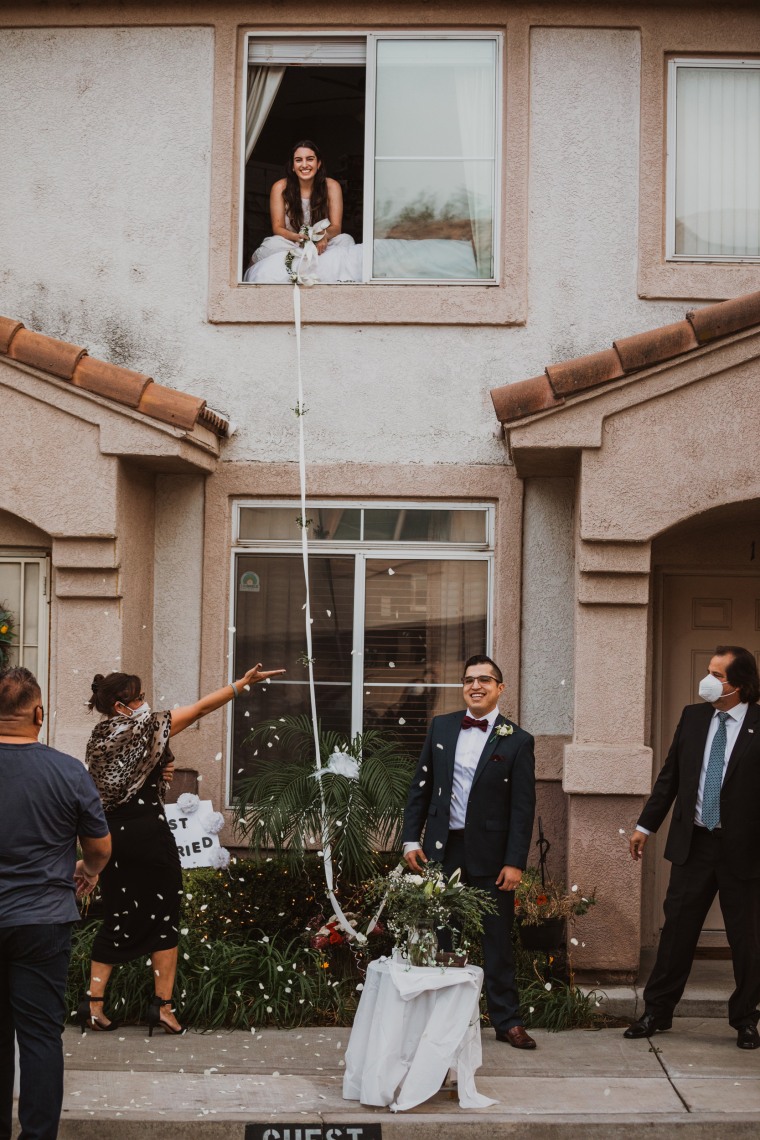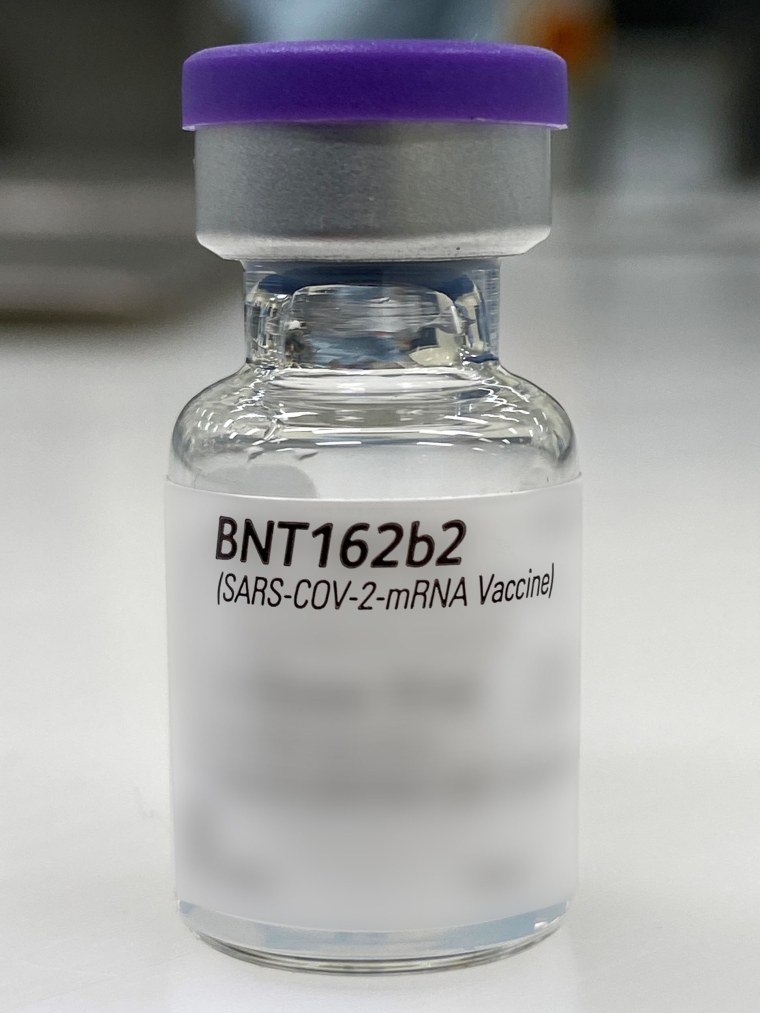Good morning, NBC News readers.
The U.K. has become the first country to approve a Covid-19 vaccine, President Donald Trump has discussed the possibility of pardons for his family and one Georgia official has had enough of Republican silence and failure to condemn threats of violence against election workers.
Here is what we're watching this Wednesday morning.
'Help is on its way': U.K. becomes first country to approve Covid vaccine, says rollout begins next week
The U.K. has become the first country to approve the use of the Pfizer and BioNTech Covid-19 vaccine, and says it will begin rolling it out next week.
"For so long we've been saying that if a vaccine is developed, then things will get better in 2021, and now we can say when this vaccine is rolled out things will get better," Health Secretary Matt Hancock said early Wednesday.
The vaccine was found to be 95 percent effective at preventing symptomatic Covid-19, the drugmaker said after clinical trials.
The pharmaceutical giant submitted an application to the Food and Drug Administration on Nov. 20 for an emergency use authorization in the U.S.
While the first Covid vaccines are still awaiting approval in the U.S., an independent advisory committee within the Centers for Disease Control and Prevention is already working on the list of who should be first in line once they become available.
Health care personnel and residents of long-term care facilities should be the first groups to be offered the vaccine, according to the proposal. Combined, those groups represent around 24 million Americans.
With infections surging — the U.S. is fast approaching 14 million confirmed cases and the virus has killed more than 271,000 in the country — a vaccine can't come soon enough.
The 911 system in the U.S. is "at a breaking point," after receiving little Covid aid, ambulance companies say.
Private EMS services collectively received $350 million in Covid-19 relief funds in April, but those companies said that money ran out within weeks.
Now as they face another coronavirus surge, many private EMS services don't know how they are going to make it.
And hospitals in a slew of states — from Indiana to Minnesota and Texas — are running out of space, overwhelmed by the number of coronavirus patients they have coming in.
Indiana's Elkhart General Hospital was forced to stop accepting ambulance traffic for a full seven hours one day last week because it was so over-capacity. It was only the second time in 20 years that Elkhart General had to make that call.
"This is exactly why we were adamant about masks and flattening the curve. This is the situation that we wanted to avoid," said Dr. Michelle Bache, the vice president of medical affairs at the hospital.
Follow our live blog for all the latest Covid-19 developments.
Trump has discussed possible pardons for family members, sources say
President Donald Trump has been discussing the possibility of issuing pardons for his family members and some close associates, multiple sources familiar with the matter told NBC News.
The New York Times first reported the discussions and said Trump has discussed whether to grant pre-emptive pardons for his three eldest children, Eric and Donald Jr., and White House advisor Ivanka Trump and his son-in-law, Jared Kushner, as well as attorney Rudy Giuliani.
The White House has not commented on the reports and Giuliani told NBC News they were "totally false."
Meantime federal investigators are looking into a potential "bribery-for-pardon" scheme involving presidential pardons, according to federal court documents unsealed by the chief judge for the federal court in Washington.
The heavily redacted documents revealed Tuesday do not name the individuals involved or President Trump. They also do not indicate if any White House officials had knowledge of the scheme.
"No government official was or is currently a subject or target of the investigation disclosed in this filing," a Justice Department official said.
Barr says no evidence of widespread voter fraud, defying Trump
Attorney General William Barr said Tuesday that there was no evidence of widespread voter fraud in the 2020 election, defying Trump's ongoing efforts to reverse the results.
"To date, we have not seen fraud on a scale that could have effected a different outcome in the election," Barr said in an interview with The Associated Press.
Barr's comments are some of the sharpest rejections yet from a Cabinet member of Trump's false and baseless claims of a "rigged" election.
The attorney general's comments came as one of the top-ranking election officials in Georgia lashed out at Trump for failing to condemn threats of violence against election workers in his state.
"It has to stop," Gabriel Sterling, a Republican and Georgia's Voting Systems manager said in an emotionally charged statement Tuesday detailing some of the violent threats election workers have received. "Mr. President, you have not condemned these actions or this language."
Sterling went on to criticize Republican lawmakers who have not spoken out.
"This is elections. This is the backbone of democracy, and all of you who have not said a damn word are complicit in this. It’s too much."
Meantime, Trump is discussing the possibility of announcing a campaign to retake the White House in 2024 on Inauguration Day and skipping President-elect Joe Biden's swearing-in, according to three people familiar with the discussions.
Want to receive the Morning Rundown in your inbox? Sign up here.
Plus
- The release of PPP loan recipients data reveals troubling patterns: The Trump Organization and Kushner Companies are major beneficiaries.
- The captain of the California dive boat that caught fire in 2019, killing 34 people, has been indicted on manslaughter counts.
- 'Brave,' 'beautiful': Celebs support 'Juno' star Elliot Page after he announced he's trans.
THINK about it
Trump White House's census power grab is a hard Supreme Court sell. Here's why, Loyola Law School professor Jessica Levinson writes in an opinion piece.
Live BETTER
How to choose the best health insurance plan for your family before open enrollment for 2021 ends.
Shopping
We're now into Cyber Week. See deals on KitchenAid mixers, blenders and more.
One fun thing
Across the country, the coronavirus pandemic forced newly engaged couples to downscale, postpone and cancel wedding celebrations due to safety concerns and stay-at-home orders.
But for one couple in California, not even contracting the virus could stop them from tying the knot.
Lauren and Patrick Delgado had been looking forward to their big day on Nov. 20 since they got engaged in May last year.
What the pair did not expect, however, was for the pandemic to force them to change their venue and guest lists three times. Then came even more shocking news, just five days before the wedding: Lauren Delgado tested positive for Covid-19.
But the couple went for it anyway: The pair exchanged vows while Patrick stood outside and Lauren was perched above looking out from a second floor window.
"It was the most 2020 wedding I have ever shot during Covid-19," said Jessica Jackson, the wedding photographer.

Thanks for reading the Morning Rundown.
If you have any comments — likes, dislikes — send me an email at: petra@nbcuni.com
If you'd like to receive this newsletter in your inbox Monday to Friday, please sign-up here.
Thanks, Petra

